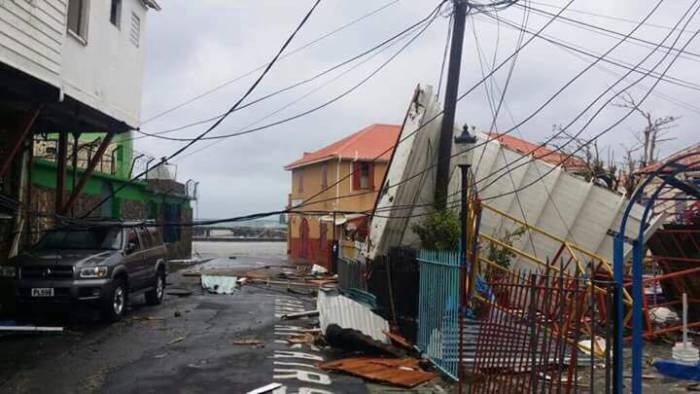By C. ben-David
“For the first time in its history, The Bahamas evacuated whole communities to safe quadrants ahead of Hurricane Irma. What’s next: wholesale evacuation of the entire Caribbean?” (Darren Henfield, Minister of Foreign Affairs, The Bahamas, United Nations General Assembly address, September 25, 2017).
“After Hurricanes Irma and Maria ripped through parts of the Caribbean … there were whispered suggestions that life on these islands was becoming unsustainable, and it might be prudent to abandon them. That fatalistic notion must never be an option for Caribbean societies. Caribbean civilization must not be made extinct – not even in part” (Sir Ronald Sanders, Ambassador of Antigua and Barbados to the United States and the Organization of American States, Sept. 24, 2017).
***
Are Minister Henfield’s words no more than hyperbolic rhetoric intended to inflame an already overheated climate change debate so as to secure much-needed foreign aid during this time of acute crisis in the region?
Are Sir Ronald Sanders’ comments merely wishful thinking by an unapologetic optimist and cheerleader for his country’s tourism industry?
Unless you are a global warning skeptic (yes, there are many skeptics — as opposed to outright deniers — still around, including a large cohort of respected climate scientists), Henfield’s fatalistic quasi-prediction would be the likely response to the most dire estimates of future global temperature increases.
Most skeptics and many true believers contend that it would be difficult, if not impossible, to reverse the effects of large increases, not because of technological limitations or disagreements about how much global warming is actually human induced, but because of the enormous economic costs and lack of political will to take drastic action by the largest carbon dioxide emitters, China and the United States, which together produce 44 percent of global CO2 emissions.
In the absence of action to stop or reverse global warming, if Caribbean Sea levels rose by one metre (3.3 feet) by 2100, all of the islands would lose much or all of their beaches while the flattest coral-limestone islands would lose lots of their inland area as well. Tourism, the mainstay of many countries, would simply disappear along with many seaside communities.
Meanwhile, a rapid rise in Caribbean temperatures would make Category 5 hurricanes like Maria increasingly frequent events, a far worse tragedy than the slow but steady annual drop in sea levels. No Caribbean country could economically withstand a direct Maria-type hit even once every 10-15 years.
Most insurance companies would not be willing to invest in the risk of these types of recurrent events. The huge insurance premiums demanded by the few willing to sell policies covering hurricane damage would be beyond the means of 90 per cent of the population.
Nor would external governments and other benefactors continue to generously assist with disaster relief for catastrophes that keep re-occurring as “donor fatigue” sets in, a Western syndrome now limiting aid to millions of drought sufferers in the Horn of Africa, more victims of the same climate change.
Had such global warming occurred, say, 1,000 years ago, the indigenous people of the Caribbean would have gradually moved to other places such as South America, the home of their ancestors, or to the mainland of Central or North America. The paucity of large, centrally-organised states occupying and fiercely defending their densely populated areas from unwanted intruders would have made such migration feasible.
Today, there is no easy solution to a need for a “wholesale evacuation of the entire Caribbean”, should our beloved Caribbean islands become uninhabitable.
Which countries collectively would take in more than a token 10 per cent of our people? Surely not the countries of Central and South America who face severe economic problems of their own, difficulties that would be exacerbated by their own experience of climate change.
Surely not our European former colonial masters who are now desperately trying to cope with an unprecedented influx of mainly economic refugees from Africa, the Middle East, and Asia.
As for North America, Canada and the United States would certainly take in tens of thousands of displaced persons, as they have when people have been forced out of other parts of the world.
But would these two super-rich countries allow the immigration of 44 million people, the current population of the islands, even over a period of, say, 20 years when they are simultaneously committed to accepting refugees and other migrants from around the world? Not a chance.
Of course, the thousands of climate doomsayers may be wrong about the catastrophic effects of global warming, or a hotter planet may be – as a few highly respected outliers keep shouting – the greatest scientific hoax of all time, or the world community may still unite to ensure that climate change is halted or reversed.
After all, human beings have been trying to understand, predict, and control the weather since the beginning of time.
The views expressed herein are those of the writer and do not necessarily represent the opinions or editorial position of iWitness News. Opinion pieces can be submitted to [email protected]
The opinions presented in this content belong to the author and may not necessarily reflect the perspectives or editorial stance of iWitness News. Opinion pieces can be submitted to [email protected].






